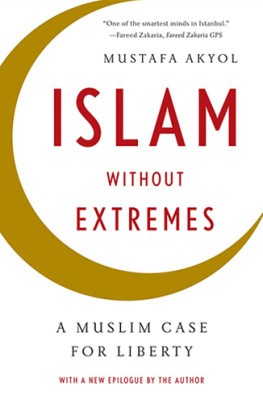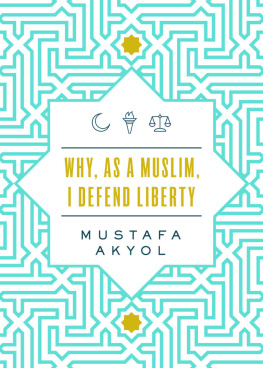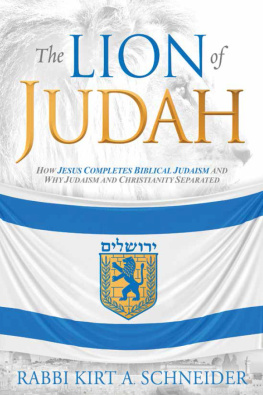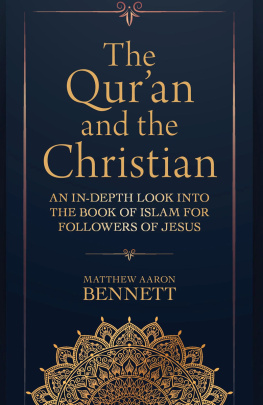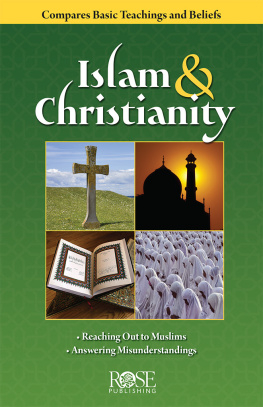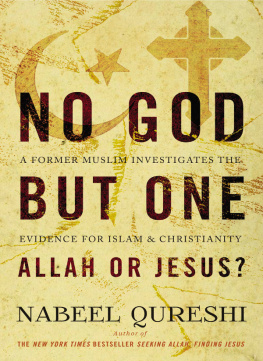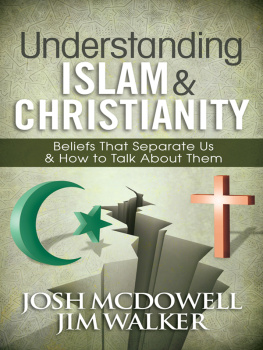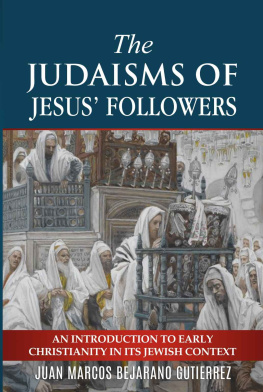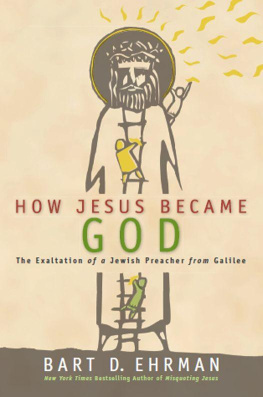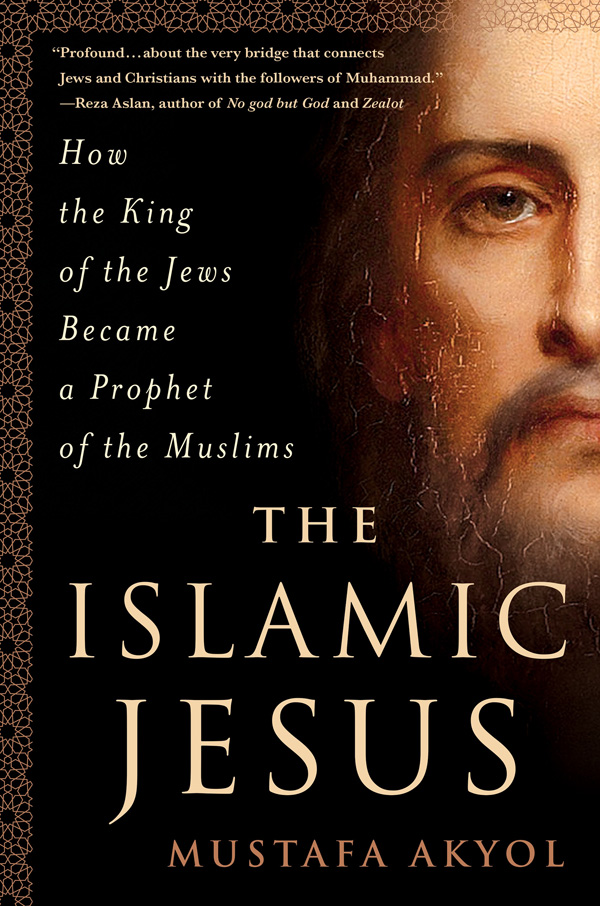Contents
Guide

The author and publisher have provided this e-book to you for your personal use only. You may not make this e-book publicly available in any way. Copyright infringement is against the law. If you believe the copy of this e-book you are reading infringes on the authors copyright, please notify the publisher at: us.macmillanusa.com/piracy.
For Riada, the love of my life
What Mahometans believe concerning Christ and his doctrine were [not] the inventions of Mahomet but they were as old as the time of the Apostles, having been the sentiments of whole Sects or Churches.
John Toland, Nazarenus: Or Jewish, Gentile, and Mahometan Christianity , London, 1718
James can serve as a desperately needed missing link between the children of Abraham.
Jeffrey J. Btz, scholar of religion, Lutheran minister
It was one of the early days of the third millennium after Christ. I was walking on the busiest street of my home city, Istanbulalso known as Constantinopleto meet an old friend at an ever-busy cafe. As usual, the street, named stiklal, which means Independence, was swarmed by not only thousands of urbanites and tourists but also various political activists.
First, I saw the communists. They were wearing red shirts on which large yellow letters spelled the acronyms of the specific brand of the peoples party that they supported. One of them handed me a flyer about the glory of the impending proletarian revolution. I took it politely, only to put it in my pocket intending to keep it until I saw the next recycling bin. Then I saw a group of Kurdish mothers sitting on the street mourning for their sons who, most probably, had been victims of Turkeys then two-decades-old and infamously draconian campaign of counterterrorism.
Walking a little farther, I saw another group that looked less familiar to my eyes. One of them, a notably smiling young man, approached me politely and asked:
Hello, sir, have you ever read the Good News?
While I was still in the Well, er moment, he deftly handed me a small book entitled ncil , which is the Turkish word for gospel.
Hmm, I see, I silently said to myself. These were the Christian missionaries, in flesh and blood, that Turkeys ultranationalists and Islamists were obsessing about. There were a lot of rumors in the press at that time about a secret decision in the West to Christianize the Turks and then somehow conquer their homeland. Some newspapers had even written that the missionaries were funded by the CIA and were distributing hundred-dollar bills inside every Bible that they passed out.
I checked the copy in my hand. Unfortunately, there was no hundred-dollar bill. Yet still it was a valuable gift that I decided to keep. I thanked the young missionary, whose name I had then learned but would never be able to recall, and moved on for the rest of the day.
At night, before I went to sleep, I opened my copy of the Good News and began reading it. It really sucked me in. I think I finished the Gospel of Matthew that very night. In the next couple of weeks, I read the whole New Testament, gospel after gospel, epistle after epistle, with great attention. Most of the teachings, especially those of Jesus, struck me with their admirable passion, devotion, sincerity, and godliness. As a faithful Muslimand thus a believer in the all-compassionate God, the God of AbrahamI found much of the Christian scripture quite appealing and inspiring.
The only passages not to my liking were those that emphasized the divinity of Jesusa belief that Islams strict monotheism can never accept and, no wonder, the Quran explicitly condemns. To my Muslim mind, Jesus as a messenger of God was a very familiar, appealing theme. But Jesus as God was anathema.
That is why, at some point during my reading, I decided to use a method: I began underlining the passages of the New Testament that I liked the most with a blue pen while underlining the passages that I found objectionable with a red pen. It soon turned out that I had more blue lines in the gospels, especially in the first three, whereas the epistles of Paul got filled with many red lines. Pauls christologya term I would learn laterwas just not working for me.
Then, toward the end of the New Testament, I came to an epistle that rekindled my ambiguous affection for this book. This particular document was both full of teachings that deeply resonated with my faith and, more importantly, contained nothing that contradicted my faith. My underlining turned out to be all blue, in other words, and no red.
There were even passages in this epistle that I found strikingly similar to my own scripture, the Quran. I was awestruck, for example, when I read the passage below in this canonical epistle:
Come now, you who say, Today or tomorrow lets go into this city, and spend a year there, trade, and make a profit. Whereas you dont know what your life will be like tomorrow You ought to say, If the Lord wills, we will both live, and do this or that.
I was astonished because this was so similar to a Quranic verse that I knew well: Never say about anything, I am doing that tomorrow, without adding If God wills.
I loved this epistle so much that I decided to share it with my informal Quranic study groupa circle of friends which, for many years, has met once every week or two to read and discuss Islams scripture and its exegeses. As believing yet questioning Muslims, my friends were happy to listen when I said I wanted to read them a passage from the Christian Bible. They listened carefully and, as I expected, they liked what they heard.
This is very similar to the Quran, one of my friends said. And there is nothing in it which says that Jesus is the Son of God, another one noted. Are you sure it is from the Christian Bible?
Yes, yes, of course, I replied. It is from the New Testament, and it is called the Epistle of James.
James? Who is James? one of them asked.
In return, I asked myself: Yes, really, who was James?
A THEOLOGICAL AHA
Over the next few months, I did some research to understand who the James was whose letter I admired so much. I learned that he was known in Christian history as James the Just and that he had a very special relationship with Jesus: he was, as suggested by a plain reading of the New Testament, his very brother. For after the virgin birth, Jesus mother, Mary, had married a man named Joseph and they apparently had other children, James being the eldest.
I also learned that, despite Jamess striking connection to Jesus, his letter, a short, three-page document buried toward the final pages of the New Testament, has not been a popular text in Christian history. I read that when early Christians decided on the canon of their scripture in the fourth century, the Epistle of James was regarded as a disputed book, one that was accepted by church fathers only reluctantly. In later centuries, some prominent Christian figures continued to cast doubt on the letter, prominent among them Martin Luther, who openly wrote against it, calling it a straw-epistle.
I realized then that I was onto something by noticing these oddities about the Epistle of Jamesits implicit divergence from mainstream Christianity and its curious resonance with my Muslim faith. But I had no time to dig deeper. I was trying to finish a masters thesis on something totally differentTurkeys Kurdish questionand I would be kept busy by other political and religious writings that followed in the years ahead. Yet, in the meantime, I kept reading about early Christianity. And I kept James, and his elder brother Jesus, in mind.


